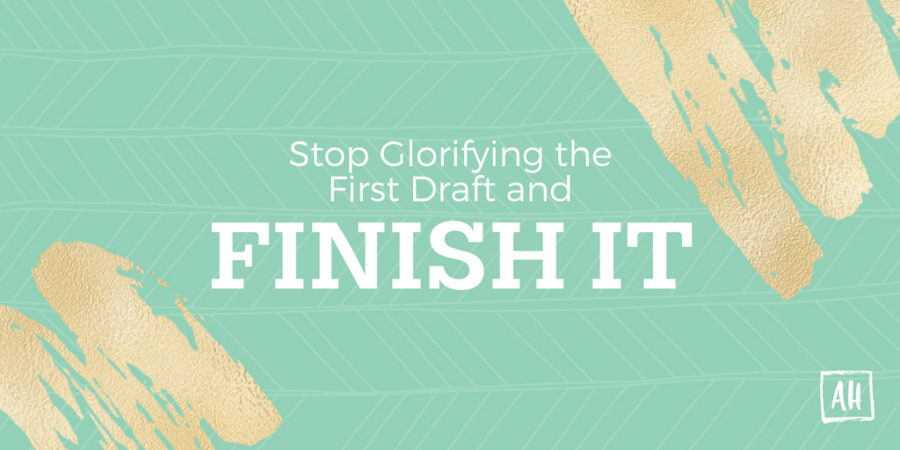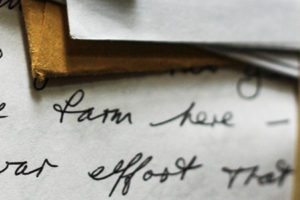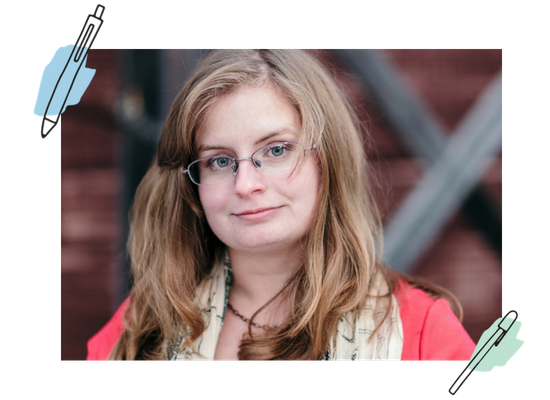As a mentee for writers, a critique partner, and person who generally has a lot of friends in very different stages of the author business, I end up talking to a lot of people about their first drafts. Especially their first-manuscript first drafts.
The attitude of many first-manuscript writers can be summed up nicely in this graphic, which I’ve grabbed off Pinterest:
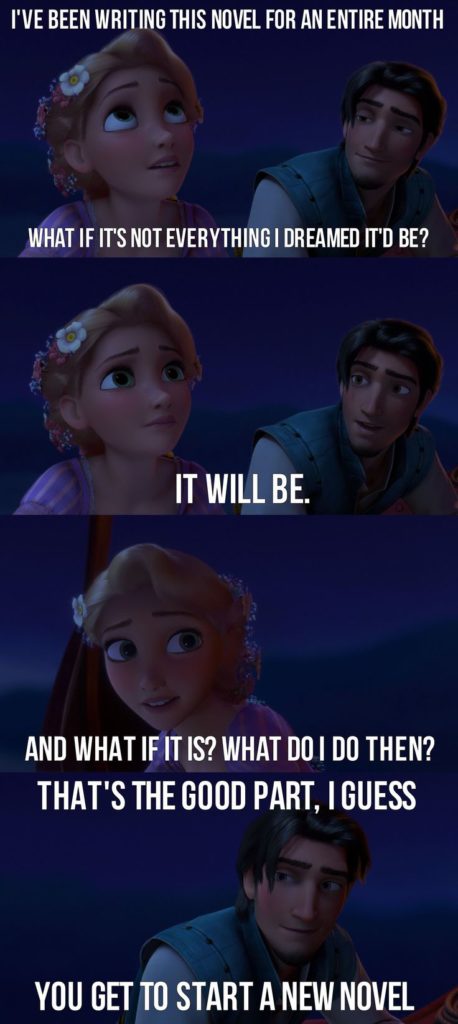
(So much is wrong about this graphic, but I only got time for the starry-eyed attitude today.)
There’s something very sweet and appealing about this. It reminds me of the sentimental early days of writing, and how every part of it felt like a precious commission, before writing became a hurricane of habit.
And there’s merit in that. It’s good to remember how it felt to create for the first time — all the nerves and excitement and dreams. That glow of writing characters and settings and conflicts and feeling like it might just be not that terrible… That’s a great feeling, a great stage in the writer’s life.
Plus, every writer’s different! Everyone has their own pace, their own methods for finishing that first draft, their own ideas about how revision might look.
But.
I’ll be honest.
My gut response to said fluffy graphic is:

The first draft — while a great stepping stone, a big leap forward, a mile marker you should aspire to and celebrate — is just the beginning.
People stay in first-manuscript first draft mode for years. I think this comes from a few faulty trains of thought, so I’m going try to address each.
Everything in My Book has to be Perfect Now
Ah yes, the perfectionist, AKA the Alyssa Hollingsworth. You keep circling back to fix stuff. You’re painfully aware of everything wrong in the wreckage you’ve left behind. You’re writing a blog entry because you don’t want to be looking at your first draft right now.
Here’s the deal, Perfect One: You will never have a first draft that’s flawless, no matter what you do, because you will never know the edits you have to make until there’s a complete story.
I don’t care if you have it plotted to the max, if you know exactly everything that will happen in the end. Until that end is there, staring at your face, your manuscript is going to be a misshapen lump of question marks.
It’s only after you get the end down that you can survey the battlefield and discover what this story is really about. And then you can get editing, shaping it into the manuscript it needs to be.
You. Cannot. Do. This. While. Drafting. The. First. Draft.
Can you clean some stuff up? Sure. Tidy it a bit? Yep. But that’s only delicately sprinkling bleach on a white shirt covered in red dye. I don’t really know how laundry works, but I’m betting that bleach ain’t gonna do much.
Finish the draft.
Drafting is Fun and Revision is Boring! (Alternately: Drafting is Easy and Revision is Hard!)
A lot of authors like to bemoan revision, so as a young writer partially through a first draft you can feel a bit like a teen about to be sent to bootcamp. If you finish now, you’ll have to (gasp, shriek) get serious and revise.
I used to think this. But guess what? I love revising. Revising is my jam. It might be yours too.
Even if it’s not, the manuscript is never going to be good without some revision. And if you want to revise, you’ve gotta have that finished draft. So…
Finish the draft.
An Artiste© Cannot be Rushed
I used to bemoan my “writer’s block” to my friends constantly. We’d gather around and pat each other on the back and wring our hands in sympathy. But even then, I had a secret notion that maybe, just maybe, I wasn’t really blocked. I was just bored.
When I asked an author I loved whether she ever had writer’s block, she replied, “I’m constantly in a state of writer’s block. I write anyway.” BAM, lightbulb.
Sometimes we do go through periods where we need to stop, step back, and reflect on what we’re writing. But a lot of the time we are really just procrastinating.
Do you want to have a completed manuscript on your hands some day? If so, you’ve got to take control of your muse. Because she’s a lazy bum and she’d rather lounge around (especially if she has an audience).
Finish the draft.
The Stubborn, Out-of-Love Cynic
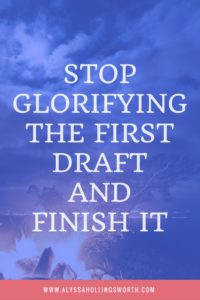 When you started this story x-number of years ago, you thought it was awesome. It was The Stuff. But now you’ve gotten halfway through, maybe even farther, and it just… It’s not looking great. Your relationship with your manuscript needs a tune-up. Maybe it needs to be burned in the fiery caldron of exes. A normal person would have fed it to the flames a long while ago.
When you started this story x-number of years ago, you thought it was awesome. It was The Stuff. But now you’ve gotten halfway through, maybe even farther, and it just… It’s not looking great. Your relationship with your manuscript needs a tune-up. Maybe it needs to be burned in the fiery caldron of exes. A normal person would have fed it to the flames a long while ago.
But not you. You’re determined. This was your dream story, the first time you ever felt inspired, the one that was going to make you #famous. If you set it aside, you’re a quitter. That’s what you tell yourself.
Everyone falls a little out-of-love with their manuscripts at some point. I’m not talking about the very normal cooling (normally happens about page 80 for me): This version can last for a period of months, maybe even a year, but a soul-deep connection with the story still moves it forward.
No, I’m talking: you haven’t written anything new in a year, but you tweak it again and again every week, all the while feeling like you’re going to drown in your own guilt because you should be doing more, enjoying it more, but this whole thing feels tiresome. You kind of hate everything in the story, and when you talk to people about it you feel the need to apologize for how every single idea in it is super lame. You cringe a little whenever you think about it.
Friend, it might be time to move on. Set aside this draft for a while and explore a new story. If you have to finish your golden story, finish it at breakneck speed in a plane+train+car crash of an ending. But finish it fast, if you have to do it at all.
Here’s the deal: Every time you write a story (especially a completed story, but even something left undone) you earn more about how to write a story. When you play the piano, your muscles begin to memorize how it feels to play certain notes at certain speeds. You start getting a sixth sense for how the song’s supposed to go. Same with writing. As you train your imagination and creativity muscles, you start to inherently know what a good story needs or doesn’t need. You know the next note without really knowing how.
But you can’t keep growing that skill if you’re stuck in a dead end, bouncing off the walls, too stubborn to acknowledge you’re so miserable you’re not learning anymore.
Take the lessons you’ve learned, leave the rest, and go to a new story. And finish that draft.
Every writer is different. I happen to be the type who rolls her eyes at lofty claims that writerly things can only be done in the right mood/time of day/phase of the moon. But I know there’s some merit to those things, and it’s cool if you operate in that way.
But if you want to be serious about this — if you want to finish projects and see them published one day — you’ve got to push forward, whatever your excuse.


